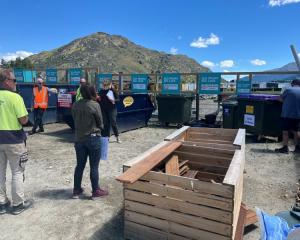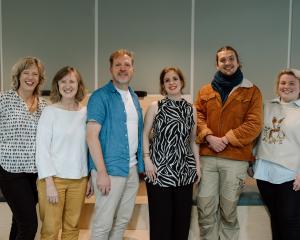However, the Dunedin doctor who will do the procedures says he had a ''hard time'' finding colonoscopy candidates to fill the 30 available spaces, which suggested most people were now able to access the service through the public health system.
The colonoscopy clinics, on this Sunday and the following Saturday at the Wanaka Lakes Health Centre, are funded by the Central Otago Pinot Noir Charitable Trust and Mercy Hospital's Charitable Outreach programme.
The hospital matched the trust's $25,000 contribution to the procedures, believed to be the first free colonoscopies offered in Otago outside the public sector.
Gastroenterologist Associate Prof Michael Schultz has reduced his fees for performing the procedures and the health centre also reduced its room rental.
Wine trust chairman Alistair King, of Wanaka, said funds were raised in January at the Central Otago Pinot Noir Celebration during an auction for the futures of a cuvee to be produced by the district's winegrowers.
The trust's previous funding partnerships with Mercy Hospital helped children needing grommets and cataract patients.
In 2007, Dunedin Hospital largely stopped doing surveillance colonoscopies for people with increased risk of bowel cancer, because the gastroenterology department was overloaded.
However, the number of elective colonoscopies available was subsequently increased to surveillance of high-risk patients, putting the hospital in line with national referral criteria.
Mercy Hospital chief executive Richard Whitney said although the Southern District Health Board's service delivery between Dunedin and Invercargill had ''levelled out'' and the backlog of colonoscopy patients had been addressed, feedback from general practitioners still indicated a lack of accessibility for semi-urgent or routine screening colonoscopies.
However, Dr Schultz's involvement in the free colonoscopy project had given him a different perspective.
He will carry out the procedures - which would usually cost between $2000 and $2500 each - on patients who have been referred by GPs in the Queenstown Lakes and Central Otago districts.
Candidates needed to have an indication for a colonoscopy, be unable to pay privately and be facing delays or difficulties in accessing the service in the public sector.
''Obviously, the public perception is still out there that colonoscopies are difficult to get hold of, but the fact is that GPs weren't quite that forthcoming with names,'' Dr Schultz said.
''So one can only assume that ... all their patients in need of a colonoscopy go to the public system, or the private system for that matter, and get the service they expect.
''But nevertheless, I thought it's a good idea to go forward with [the free procedures].''
Some of the referrals also suggested a ''lack of knowledge'' among Otago GPs about the public health system's colonoscopy criteria, which some mistakenly thought their patient would not meet.
While concerns about colonoscopy accessibility persisted, ''at least we are operating within the national framework'', Dr Schultz said.
''We're never going to be able as a country to provide open access colonoscopy ... so you will always find the GP who will say 'my gut feeling says that this patient has cancer'. Well sorry, a gut feeling's not a hard enough indication for this patient to have a colonoscopy.
''But at least we are not different to the rest of the country. We do provide every service in terms of colonoscopies that is required by national criteria and we're quite proud that we have achieved that now.''












